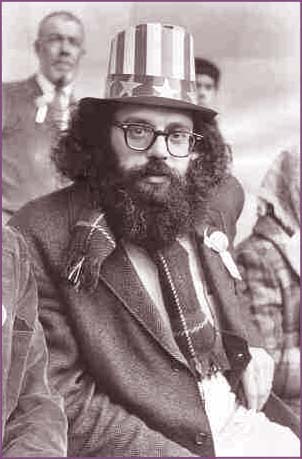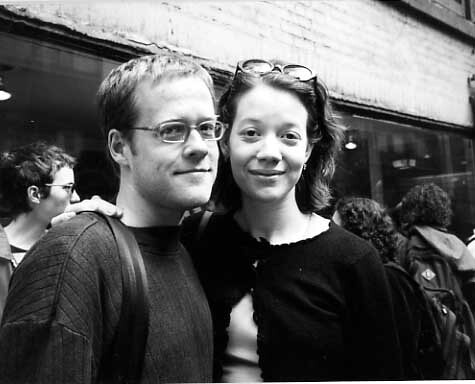I kind of drifted off at the end there about setting aside my interest in poetry (as a genre) for what I feel is my more abiding interest, in the poetic (as a modality?). In the spirit of spilling out and discovering my present thoughts on the matter, I'd like to test out a hesitant definition of the poetic.
1. the poetic is.
2. the poetic is also poiesis.
3. the poetic also is indirect (at the noumenal).
4. also, the poetic is shared.
2. the poetic is also poiesis.
3. the poetic also is indirect (at the noumenal).
4. also, the poetic is shared.
Really quickly:
Poiesis, "to make." This is meant to guide a sense of the poetic as inflected more within an actively, as opposed to passively, receptive charge: it would then imply a degree of change or flux in the poetic, a push towards a becoming.
Noumenal, from Kant, the "thing in itself" as opposed to the phenomenal, its appearance (it may take more reading or thought, but Rudolf Otto's notion of the numinous, a sense of the wholly other which may underwrite a theological orientation [the sense I get is that Otto's term was developed independently from Kant's prior one] probably pushes things out too far).
The noumenal, by definition, it seems, cannot be directly presented or grasped, but my sense of the poetic is that an immersion in the poetic is guided by the possibility or even promise of an indirect sense, glance, or at least anticipation, of the noumenal, of a real itself that resists representation.
Shared, or not reducible to individual psychology or whim. The idea is that the poetic shouldn't be reduced to one's subjective orientation, anywhere along a writer-reader continuum; this suggests, right now for me, two possible spins: 1) the poetic adheres to the object, and can be discovered, or 2) the poetic is precisely an event in which a subject-object categorization of experience fails. My own temperament is to leans towards the second option. Either way, I would like to suggest a spirit of shared space in my view of the poetic.
Part of what I'm trying to do for myself with these attributes of the poetic is to differentiate what I'm interested in from competing modes or tendencies that may have generic or media sympathies with the (Tostian) poetic. That is, there's a lot of poetry I'm simply not interested in, either critically, creatively or otherwise. But I am interested in "the poetic" both in my own writings and in the projects of others, regardless of genre or media.
For instance, my strawman version of Language writing would resist being labeled as (Tostian) poetic, even though it would be very strong instances of writing that pivots on notions of both poiesis and being shared (it would actually seem to join these two attributes as its major intervention): it prides itself on a collaborative approach to meaning, and on its address of its own social and historical embeddedness. My strawman version of Language writing, however, is focused mostly on questions of signification and not on any pursuit or glimpse of a real prior or outside language; it would be more of a critique of a "desire for presence" as opposed to an activation or possible culmination of that desire.
That said, as soon as I move from my strawman version of Language writing to specific texts or authors, I begin to identify Hejinian's My Life or Silliman's "Sunset Debris" or McCaffery's "Lastworda" and sound-poetry, etc., as works that move towards the noumenal, usually by a logic of accumulation, as opposed to some piercing gesture. This would be fairly consistent with my preference for the above Language writers over others whose projects, as I read them, veer more towards critique; this isn't absolute, as Andrews' I Don't Have Any Paper So Shut Up is way up there for me as well, but it is, I think, a general tendency for me.
I suppose a specific sense of the poetic as a modality would suggest some other modality to define it against, which would be, I guess, the prosaic.
This would be an aesthetic tendency that is less concerned with poiesis (especially in terms of medium) or the noumenal (though it may describe an encounter with the noumenal, the prosaic itself doesn't attempt to indirectly encounter it), though the prosaic would have a strong emphasis on its shared nature, as it would have little motivation, I think, to be otherwise. What do I mean by this? I think it may have something to do with the prosaic being a mode of being while the poetic is more a mode of becoming; that's fairly easy, I think, but the difficult thing for me will be to argue how this is also shared, since most narratives or notions of becoming/transformation fall back to privileging or even fetishizing the orientation or psychology of a subject.
Break.
Part of what I'm struggling with in all of this, what a motivating factor is, is my own tendency or preference for a phenomenological orientation towards questions of aesthetics and experience, a tendency which on one hand I am most at home in but on the other I also resist because of how easily that tendency can fall into an ahistoricism and willful refusal to regard the social situation of what the poetic may be.
But I also resist complete secularization partly because I cannot help it, and partly because I feel the cognitive, emotional and aesthetic range of the (comfortably or strictly rational or dogmatically) secular to be claustrophobic.
Break.
Some texts of the (Tostian) poetic would likely include The Maximus Poems, The Geographic History of America, John from Cincinnati, Juniper Fuse, Spring & All, Highway 61 Revisited, Notebook of a Return to the Native Land, Leaves of Grass, Heart Food, the Arcades Project, Divine Horsemen (film), The Battlefield Where the Moon Says I Love You, the Martyrology (what I've read of it), Curves to the Apple, the Anthology of American Folk Music.



